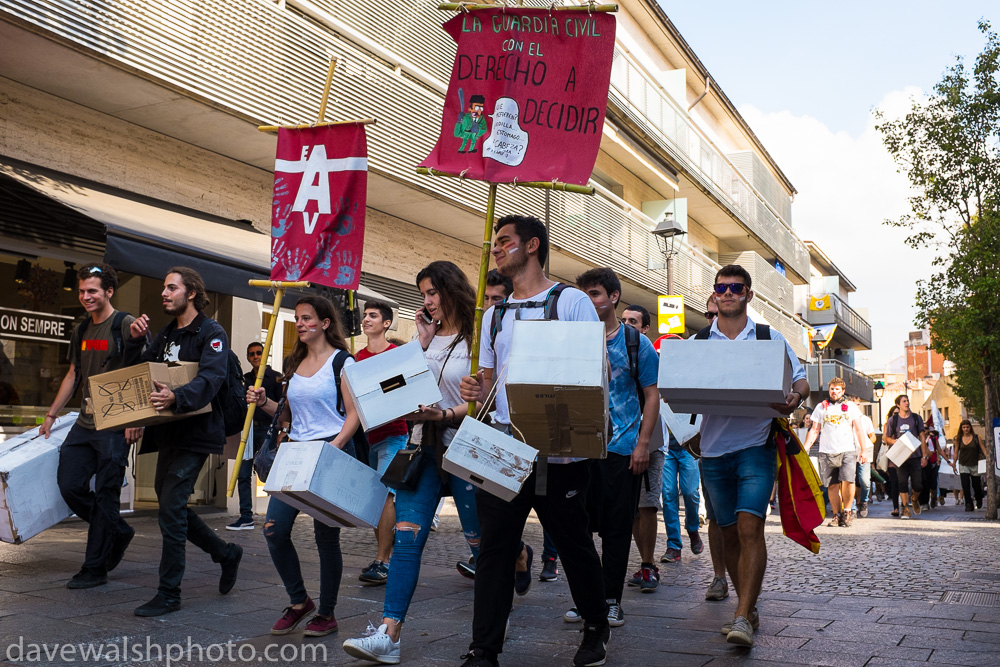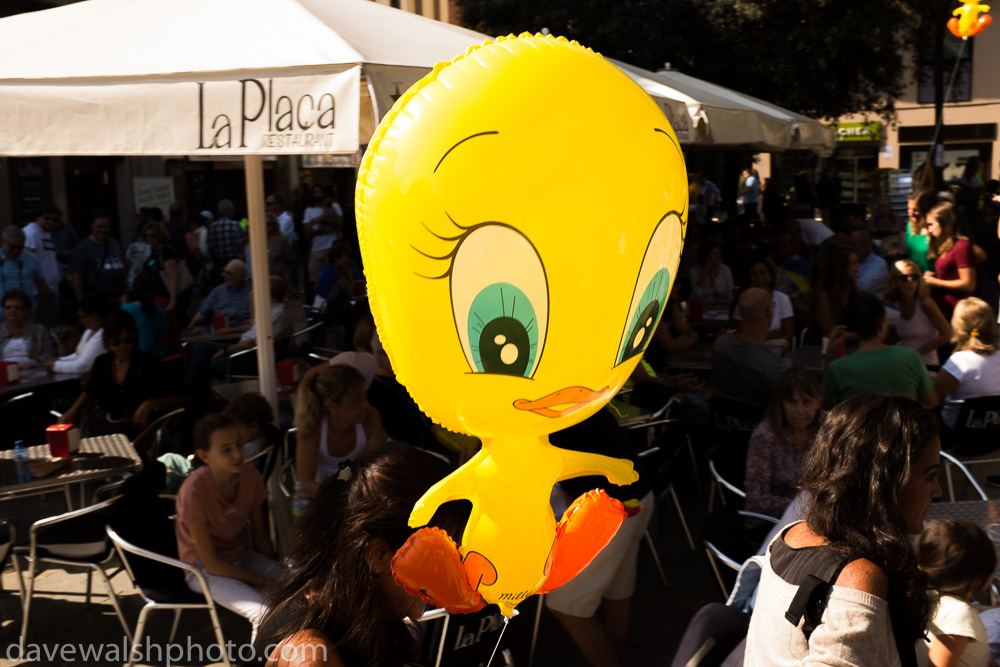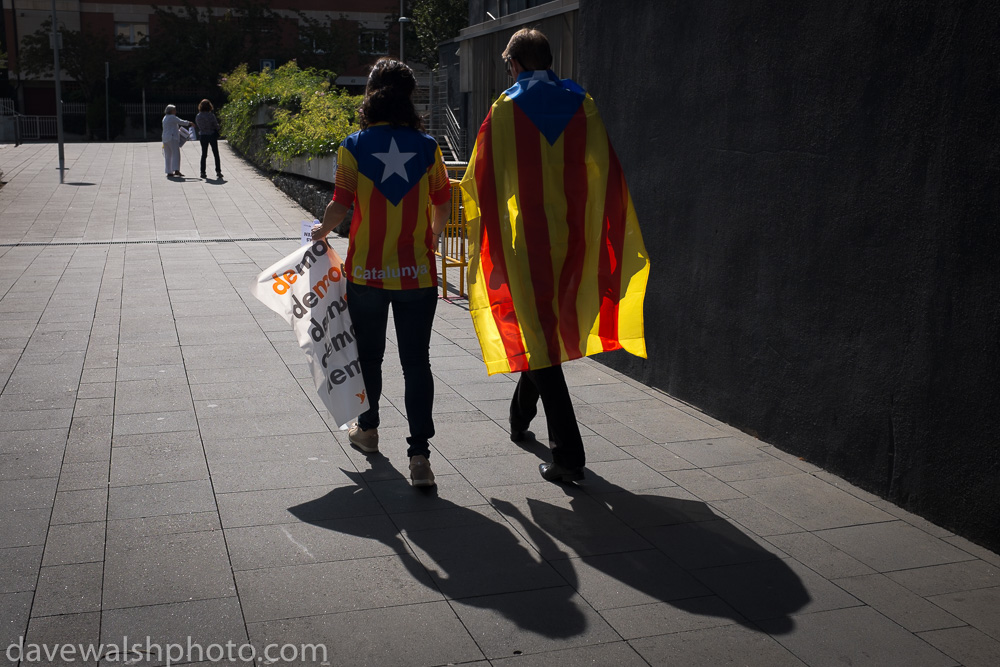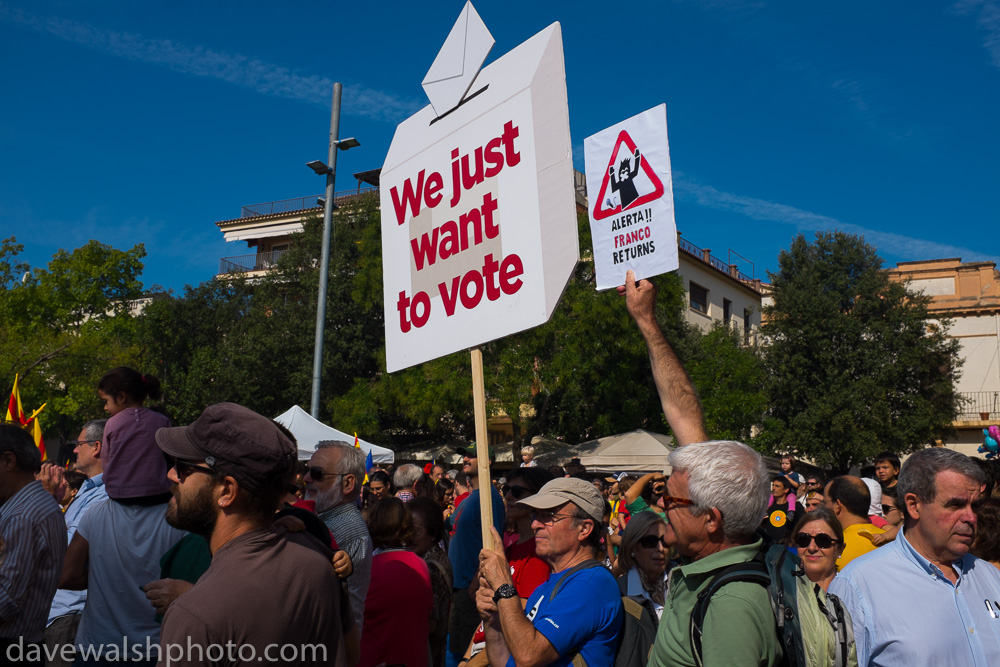“We just want to vote”
This is the message, in English, that many Catalans have been sending out to the rest of Europe, in the run up to this Sunday’s planned independence referendum.
Most Catalans, or more correctly, most people, who can vote here want to have a say, in what the Catalan Generalitat (regional government) has said will be a binding vote. Depending on which polls you read, less than half of voters want independence. While these stats are widely reported, I did read a poll today that suggested there would be 63% or more turnout and an 83% yes vote.
There’s plenty of commentators saying that Spanish Prime Minister Mariano Rajoy is right in saying that the Catalan vote is against the Spanish constitution, and that the Catalan government is right because they are fulfilling the mandate given to them by the electorate. Many millions of words have been written about how we got here – and whether the problem goes back months, years, decades, beyond the Civil War and into medieval times. Whether it’s over money, or the banning of the Catalan language during the Franco era or Catalan exceptionalism. These are all valid discussions, but for the last couple of weeks, I’ve become more concerned with the ongoing censorship and the attacks on civil rights in Catalonia by the Spanish establishment.
Rajoy and his government – and the Madrid establishment, are so determined to stop people getting to polling stations that authorities have threatened teachers and more than 700 mayors with prosecution. Peaceful protesters are being accused of sedition – of threatening to overthrow the state. Hundreds of websites, including ones run by the Catalan government, political parties or civil society groups have been blocked. On Friday, Google’s Madrid office was raided and it was asked to remove a smartphone app that provided information on nearby polling stations. Google complied. The Spanish government has created an internet “whack-a-mole-game” where every time a court order is applied, several mirrors of a website appear, and Catalan President Carles Puigdemont just tweets out a new link. Last week, the Guardian Civil raided printers, newspapers, local government offices, political parties, and even the secretariat of the .cat domain, arresting 14 people, including a junior economy minister. Referendum materials were seized, including 10 million ballots. On Thursday, Puigdemont tweeted a video of new ballots being printed.
In response to the Spanish government crackdown, thousands of people took to the streets in a determined but cheerfully peaceful protest. A week later, they are still at it. On Thursday morning, I met a band of 50 or students chanting “votarem” – “we will vote”, on their way to Sant Cugat railway station. They were off downtown to demonstrate with thousands of others in support of the referendum. Catalonia’s students appear highly mobilised and motivated – classes have been suspended, and they have setting up open air help centres to advise senior citizens on where they can vote.

The ability of the Catalans to mobilise and organise mass events that involves food, music, dancing and fun is, at any time, impressive. Their ability to combine technology and community spirit in the face of oppression is extraordinary. The movement has been peaceful, fun, family-oriented, inclusive and good spirited. After referendum posters were seized, online repositories of posters were created, leading to flash mob style mass leafleting and postering operations.
The Madrid-appointed public prosecutor in Barcelona has said that minors attending demonstrations will now be monitored, while the leader of the Christian democratic and conservative political party, PPC, Xavier García Albio, is claiming that “only fanatics take children along to vote”. Trashy Madrid newspaper La Razon published an article claiming that Puigdemont is using children as “human shields”. Such claims are not only ridiculous, they are wrong in many ways – no one is using kids as shields, and where I come from it’s quite normal for families to attend activities important to taking part in society just as it here in Catalonia – or elsewhere in Spain.
Helicopters and light planes have been banned from above Barcelona for the weekend, in case the press broadcast pictures of cheering crowds. Except drones out in droves. Hordes of pro-independent farmers have driven tractors into central Barcelona, to camp out for the weekend. The Bombers, or fire service, has backed independence in a spectacular Greenpeace-style way, and has pledged to provide a safe corridor for voters to enter the polling stations.
In response to orders to the police to take control of voting centres – mainly schools – between Saturday night and Sunday night, members of the public are camping overnight in the schools, and apparently there’s mass tournaments of “rock, paper scissors” taking place.
Despite the peaceful movement here, the Rajoy government continues to treat the referendum like some kinds of sinister insurrection, and has drafted thousands of extra police from elsewhere in Spain. Many Guardia Civil are billeted in passengers ships in Barcelona port, where a TV camera picked up someone performing a Nazi Salute. One ship is painted in Looney Tunes characters, including Tweety and Sylvester, leading to the adoption of Tweety, aka Piolín, as a symbol of the pre-referendum movement. The Twitter hashtag #FreePiolín ended up trending worldwide. Warner Brothers since issued a “cease and desist” order to the Spanish government, forcing them to cover up Tweety and friends.

The international response has been slow, but as the weekend draws near, it is picking up, with experts from the Office of the High Commissioner on Human Rights issuing a statement criticising Spain’s behaviour, and politicians from around the world adding their voice, including 57 MEPs. I’ve been busy haranguing the Irish Taoiseach and his ministers, as well as opposition leaders and spokespeople, senators and MEPs. I hope EU residents in Catalonia have been urging their governments to do the same. The last time I checked, Leo Varadkar’s government Ireland, and the main opposition party of Fianna Fáil, were still claiming that “the Catalonia independence referendum is an internal matter for Spain”, as party leader Michael Martin wrote in response to my email.
I responded:
“If Catalonia declares independence, it will not just be an internal issue for Spain. If Spain crushes the civil and human rights of the people here in Catalonia, and introduces further draconian measures to quell any disobedience towards its centralist, and let’s be clear, post-Francoist right wing government, then it will no longer be just an internal issue for Spain.”
The leader of Ireland’s Labour Party, Brendan Howlin wrote back to me, saying that the party supported the “right to self determination but we do believe it must be pursued through legal means”, and that “it is clear that the heavy handed approach by the Spanish Government to the proposed referendum in Catalonia will be more likely to inflame the dispute and strengthen the independence movement”. He promised to speak to the relevant minister. That’s more like it.
As someone who works on strategy and tactics in my professional life, the Spanish government seems to have done everything wrong, starting with one of the first rules of dealing with any conflict. It has failed to see the situation from its opponent’s point of view.
“If you know the enemy and know yourself, you need not fear the result of a hundred battles. If you know yourself but not the enemy, for every victory gained you will also suffer a defeat. If you know neither the enemy nor yourself, you will succumb in every battle.”
― Sun Tzu, The Art of War
While some Catalan independentists have, and always will want independence, many have been converted to the cause because of the Spanish government’s bullheaded “no” approach to any kind of realistic negotiation and simply demands loyalty and obedience. Its worthing noting that the current era of Catalan independence campaigning started off with Madrid pushed back on negotiations over money, pushing even middle of the road, liberal Catalan politicians to think of a different way forward. And that way forward, for many, means waving goodbye to Spain. The two nations are now speaking different languages, literally, and figuratively.
It’s a breakup.
Catalonia: I’m sorry Spain. It’s over between us.
Spain: I don’t think you love me enough.
Catalonia: It’s not you, it’s me. I still care about you. I just want to be on own.
Spain: You are not taking this relationship seriously. I want you to be loyal and to love me.
Catalonia: Goodbye Spain
Spain: You can’t just leave me like that. Come back here!
Catalonia: Well, then, fine, then, goodbye. Let’s meet for coffee soon.
The attitude of the Spanish government, coupled with the seemingly non-stopping slapping down of progressive regional laws on energy poverty, fracking bans and wage equality, and covert smear campaigns against Catalan leaders (Operation Catalonia) has hardly endeared Catalans to Spain’s conservative Partido Popular government.
The poll I mentioned above was a follow up from one conducted in mid-September – Since then, a projected 600,000 people who were going to abstain, now want to head to polling stations, enraged by the behaviour of the Rajoy government. Out of an electorate of 5.3 million, that’s significant.
At some point along the way, Rajoy could have rescued this situation and negotiating in good faith, even to stall the procés or give moderate secessionists a little of what they wanted. But he didn’t, because that’s not his style. He waited for Catalonia to trip itself up, which it hasn’t done, at least not yet.
“The Spanish government and [governing Popular Party] have been asleep at the wheel, waiting for it to end and now it’s got out of control,” – me, quoted in The Irish Times
Why does Rajoy want to block the vote? Why doesn’t he allow it, then work on watering down its authenticity, and declare it invalid? After all, he has declared it illegal, unconstitutional.
Maybe he is scared. Maybe he is scared because the Catalan independence movement has put a huge amount of effort into not just organising the referendum, but into laying out roadmaps of how it will manage a new, independent republic, down to how to attain citizenship through residency and how taxes will be managed.
He’s scared that the enormous, popular and good-natured outreach done by the likes of Catalan Foreign Minister Raül Romeva throughout European countries might have actually reaped results, and if a declaration of independence comes, a significant amount of countries may choose to recognise Catalonia as a valid, sovereign nation. He’s scared because while Brussels has mumbled about Catalonia not getting “automatic EU membership”, the ever ambitious, upwardly mobile and energetic Catalonia might just manage to set up trade, diplomatic and other agreements.

He’s scared because Catalonia provides 20% of Spain’s GDP, which helps Spain to subsidise lower performing regions, and to keep tossing money at the national debt. He’s scared because of this money doesn’t keep coming in, it will create another financial crisis, and because if other regions see Catalonia waving goodbye, others – like his own Galicia and and the troublesome Basques might do the same.
And he’s worried about his own political future. If Rajoy blocks the vote, Spain will be in crisis. If he allows the vote, Spain could still be thrown into crisis. He seems to be sticking with the crisis that’s quantifiable – a crisis born of his own inaction.
It seems to me that Rajoy thinks – or at least did think – that the referendum battle could be won by force. But in asymmetrical battle, force is not always the strongest attribute.
I’m hoping that someone in Madrid has some sense, and that Spain’s boots on the ground aren’t pushed into intimidating or provoking people.. The world is watching Catalonia. It is watching Spain, and I hope Rajoy and his colleagues realise this.
I’m writing this late on Friday night. In 48 hours, we’ll know how the vote went, but will won’t yet know what Monday will bring. I’m hoping that people here can vote, and that the international observers find that the referendum has been carried out satisfactorily. I hope that everything goes peacefully. And I hope that Catalonia votes for independence, and that it gets it.
Dave Walsh, is a writer and communications consultant, living in Sant Cugat del Vallès, Barcelona. Following the events of October 1st, 2017, he wrote this article for the Irish Times.
Follow me on Twitter: @davewalshphoto
